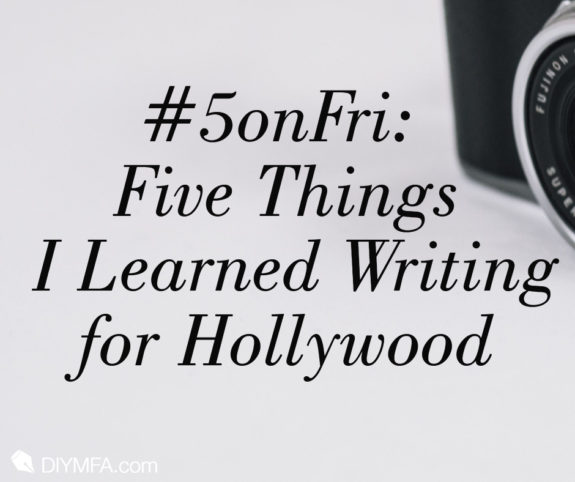I started my writing career as a news producer at MSNBC but decided to throw away a perfectly good career in journalism for a shot at Hollywood glory. After moving to L.A., I got my foot in the door by working on a bunch of network TV dramas as the Writers’ Assistant. So I picked up a few cups of coffee, along with a few ideas about what works/doesn’t work for TV writing.
Eventually, I graduated from doing coffee runs to selling my own screenplays. Every screenwriter I know has a drawer full of unfinished projects, and I decided that a few of my “drawer” ideas might make an interesting book series. So an idea for an animated kids show about a journey to a world of candy became my new book, The Kandy Kingdom Saga. While writing a novel is very different from writing a screenplay, a few things I learned in Hollywood helped me write the book. Maybe they’ll help you too.
1) Ignore feedback at your own peril
When you write a TV show in Hollywood, you get notes and feedback from the writing staff, the creator, the studio producing it, and the network airing it. So you get used to hearing “constructive criticism” about your writing. Sometimes you agree with the notes, and sometimes you wonder if they actually read your script.
You might not like someone’s suggested fix for the problem they’re pointing out, or you might not even think there’s a problem to fix. But the truth is: something is bumping the reader.
Let’s say your character is a scientist who discovers a hidden wormhole, and someone suggests turning the character into an accountant. You might think: that’s a horrible idea, accountants don’t discover wormholes, why would I ever listen to anything this person says?
But take a moment to think about it. ‘Cause something just ain’t right. Maybe your character’s backstory, personality or way of talking doesn’t make sense for a scientist. Don’t discount or ignore feedback. There’s almost always a kernel of truth to notes. It’s the writer’s job to figure out what that kernel is and how to address it.
2) Writing is rewriting
One year, I worked on Boston Legal, created by David E. Kelley. For two seasons, he had three shows on the air at the same time – Boston Public, Ally McBeal and The Practice. Legend has it that sometimes he’d write an episode for all three shows in one week. Most writers take a few weeks to write a single episode. But he cranked out three excellent, 60-page scripts in one week.
If you’re David E. Kelley, you might not need to rewrite. For everyone else, writing is all about revising. You rarely get it right the first time. There’s just too much to get right all at once.
So after completing a first draft, I do various, seemingly endless “passes” focusing on different aspects. I do a pass where I punch up all the dialogue, another where I develop the main character’s arc, another to make sure everything “tracks” and adds up, etc.
3) Character counts. A lot.
Because network dramas have commercial breaks, each “act” should end with a “holy sh*t” moment, like a reveal that changes everything. Twists and turns keep the story interesting.
But you could have the greatest M. Night Shyamalan-esque plot twist at the end of your episode, and without characters that the audience cares about, nobody’s going to stick around to see the end of the show.
Characters are what bring viewers back, episode after episode (and readers back, book after book). So I try to develop characters with unique personalities, their own way of speaking, realistic flaws, and a detailed backstory.
4) A great title goes a long way
A great title tells you what the project is about without being too on the nose, captures the tone and genre, and sounds catchy, original and memorable. It’s a lot to pack into a few words.
I pitched a lighthearted series about a female cop going undercover who gets coached by an actor famous for playing a cop. Fake cop, real cases, hijinks ensue. I called it Firing Blanks, which I thought was fun, original, and captured the vibe and premise of the show. I didn’t sell that one (but at least I can’t blame the title).
On the other hand, I pitched a dark, weird, sci-fi show set on a haunted spaceship – I called it Phoenix, which tells you absolutely nothing about the story, tone or genre, and is pretty bland. I didn’t sell that one either (though even a great title wouldn’t have saved that pitch).
I definitely wish I’d spent more time on some of my titles. After all, a killer title is no guarantee of success. But it is the first (and maybe last) thing somebody reads.
5) Have a focus for your writing, like a genre or topic
Hollywood pigeonholes writers. If you write one good sci-fi horror movie, they want another sci-fi horror movie from you, not a historical costume drama. That can be frustrating if you want to write in different genres.
And early in your career, you should experiment. Write a thrilling spy novel, a silly rom com movie, and a gritty cop show. Hell, write a rom com movie about a spy novelist who dates a writer on a cop show. Sky’s the limit. See what you’re good at and what you like writing.
But eventually, it makes sense to focus. Pick a genre and become an expert in it. It’s not just Hollywood producers who want your next sci-fi horror project. Readers usually feel the same way.
Look at J.K. Rowling. She followed the Harry Potter series with an adult book about local British politics, but then came back to the genre that made her famous, writing the story for a Harry Potter stage play and then two H.P. spinoffs, the FANTASTIC BEASTS movies. Even for the best-selling author in the world, it pays to stick to a genre.
So those are five things I learned from Hollywood. Then again, as the most famous screenwriter, William Goldman, once wrote, “Nobody knows anything.” So take my tips with a grain of salt. Especially since this article could probably use another round of revisions.

Gregg Millman is a Screenwriter and Novelist who creates movies, TV shows and novels for kids, including a Nickelodeon movie, ONE CRAZY CRUISE. His new fantasy novel for 8-12 year-olds, THE KANDY KINGDOM SAGA, is the first in a series about the adventures of two kids in a magical world of candy. He’s currently working on Book 2.







